
Varlet Review
I've played most of FuRyu's RPG library at this point. While there are some entries that I have enjoyed more than others, I'm still looking for that diamond-in-the-rough that strongly stands out in the sea of mediocrity — one that I can easily recommend to fans of the genre with minimal hesitation or caveats. Varlet is the latest title in the catalog, developed by Aquria, and the first to be released simultaneously worldwide. I didn't necessarily go in with high hopes, but as the credits rolled, I was left both disappointed and somewhat bewildered. At best, Varlet is a stale command-based RPG with social sim elements. At worst, Varlet is a fundamentally broken game.
Let's start at the top. As I said, Varlet is a school-themed RPG with social elements and command-based combat components. Persona is an obvious inspiration. You are a transfer student to Kousei Academy, the first school to implement a sort of 'everything app' virtual reality social network known as “Johari”. You are given a virtual AI companion known as MENA, and at the start of the game, you complete a personality quiz that determines your social stats in morality, sympathy, altruism, Machiavellianism, psychopathy, and narcissism. These stats will ostensibly affect dialogue choices made available to you, as well as your aptitude in combat.
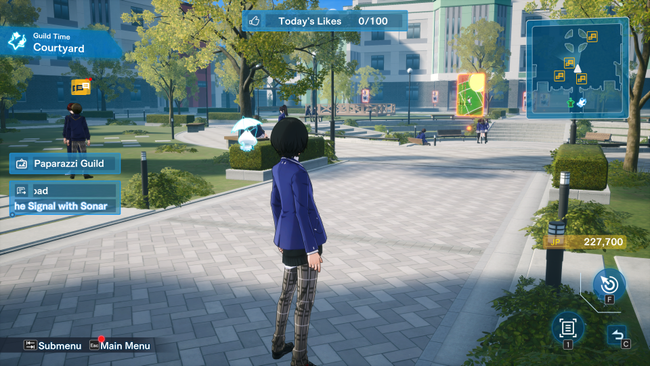
As an RPG, Varlet is essentially split into two separate halves. You have your typical dungeon-crawling battle affair, as well as your daily life at school.
The social side of things will have you roaming the Kousei Academy grounds as a member of the Student Support Services guild — SSS for short — where you solve student troubles around campus. During your daily SSS sessions, you can do a number of things:
- You can find Lost Items
- You can read Augmented Reality (AR) Notes
- You can place AR advertisements
- You can enter bite-sized mini dungeons for battles/items (these pocket-dungeons are called 'Glitches')
- You can complete special Requests from students, which are simply one of the above four things
- You can find Triad Judgement decisions to raise one of your social stats
- You can listen to student conversations (indicated by an icon on the map)
Most of these activities let you collect 'Likes', which are tallied on your SSS club meter. The more Items you find, Notes you read, or Ads you place, the more Likes you get. You'll find these various interactables by pressing a "Sonar" button that works, expectedly, like a radar. It'll highlight the items nearby you can pick up, the notes you can read, and the mini-dungeon 'Glitches' you can close. Be prepared to hear MENA say "Sonar!" about a thousand times. Complete your Likes quota each day, and soon enough, your SSS rank will go up.
Aside from collecting Likes, you may also learn facts about various students on campus, which are noted down in a journal you can access from the menu. These read like a fact sheet for each NPC with details like "Weak Point: Lacks Self-Restraint" or "Their Type: Careful". Ultimately, nothing really that interesting.
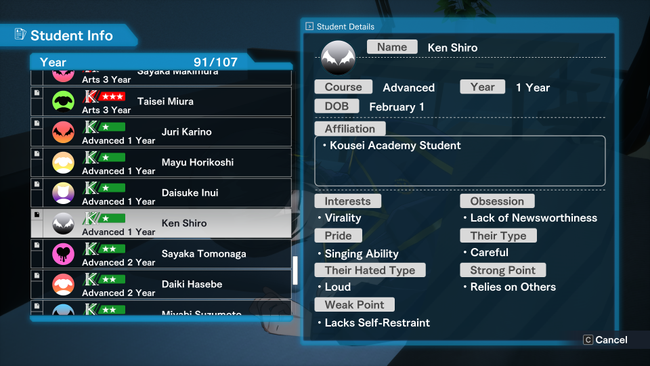
So what does collecting Likes and raising your SSS rank get you? Turns out, almost nothing. Collecting Likes, raising your SSS level, and filling out the student compendium don't actually accomplish anything. Some of the student conversations that you can listen in on are mildly amusing in their own right (the trio of hopeless lovestruck boys getting flirty prank texts from the same girl is kinda fun), but note that there are probably more than a hundred of these, and the batting average here is not stellar.
As far as I can tell, raising your SSS Rank does precisely one thing. It increases the range of your 'Sonar' by a nearly imperceptible amount, meaning you can see Items and Notes from slightly further away. Otherwise, there's no other point to collecting Likes, or if there is, I was ignorant of it, and it didn't matter. You are simply filling out your SSS rank for the sake of filling a meter, or you are filling the Student Info compendium just to say that you did so. I want to be clear here, Varlet asks you to perform your SSS chores on a near-daily basis. That's a considerable chunk of the game that seems to lack purpose.
The SSS activities that *do* have some marginal utility (and actually intersect with the rest of the game) are the mini-dungeon Glitches and Triad Judgement choices. Mini-dungeons are pretty self-explanatory. You fight a few battles and open a few chests, so you gain EXP and items.
Triad Judgements are basically quick 'what would you do in this situation?' type choices. You find a diary on a bench. Do you read it, or do you return it to its owner? Your choice here will raise one of the six social stats I mentioned earlier — morality, sympathy, altruism, Machiavellianism, psychopathy, and narcissism. More on these later.
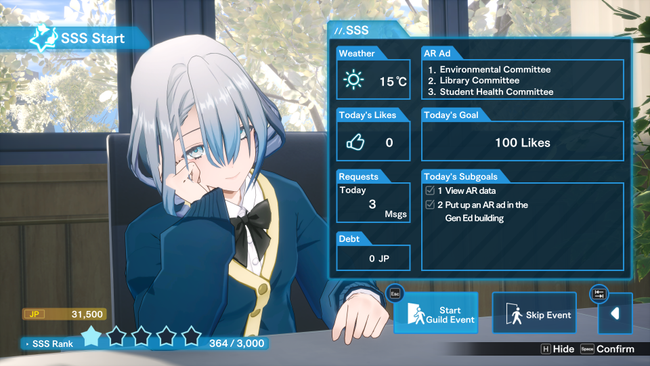
Collecting items, gaining EXP, and raising social stats do — on paper — seem worthwhile to do. But ultimately, I'd argue that these don't matter either, just like SSS rank or Student Info. EXP and items are plentiful in the requisite story dungeons that you must do anyway, and the utility of social stats is dwarfed by other components of the game's combat design. Let's talk about it.
Varlet is a command-based RPG, leaning closest to a 'round-based' system. At the beginning of each round, you pick the abilities that each of your three battle characters will enact that round. Different abilities require a different number of 'steps', which determine where the action will take place in the timeline (seen to the left side of the battle UI). Stronger attacks usually take more 'steps' to initiate, which means you are at risk of receiving damage beforehand, or even having that action canceled entirely before it executes.
Some components of this combat system are relatively interesting. Each round, you'll need to keep track of the enemies' position in the turn order, see who they are targeting, and ensure your actions line up to counter as effectively as possible. It's very important to note that there is no MP or equivalent gauge to manage here. You can use whichever attacks you want to, even your strongest abilities, every round if you want to. It's just a matter of taking more 'steps' to do so.
Each character has a unique set of abilities that they can learn. Sota, for example, is primarily your damage dealer, with high-power and attack buffing skills. Noa is a paladin or guardian of sorts, shielding the party while reflecting some of the damage she takes. Starting out early in Varlet, figuring out each character's role in combat and using them effectively with the turn-order each round shows promise, or is at least competent.
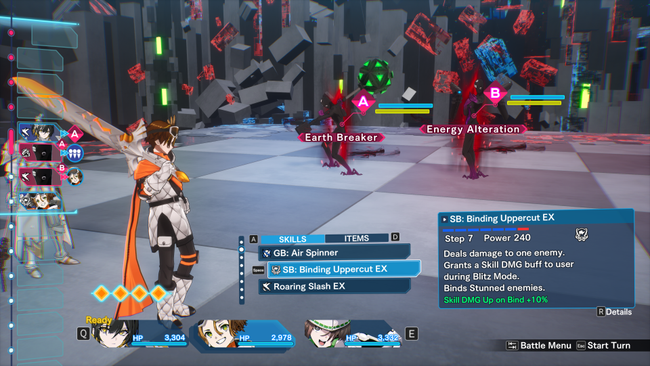
It's at this point that I need to tangent off into a discussion about game balance and resource management. By roughly the halfway point in Varlet, I realized that I 'solved' the game. I could not lose. I had figured it out - not that it was hard to do this. Varlet essentially hands you the 'I win' button in plain sight.
The 4th character (of seven total) that joins your party is Aruka. While she can be plenty capable on offense, one of her primary roles is clearly to be your party's healer. She starts with a skill that can heal any character by 40% of their total HP. A bit later on, this can be quickly improved so that she can heal the entire battle party for 40% HP. This is where the game balance starts to completely fall apart.
Remember how earlier I said there is no MP gauge? That means Aruka's healing ability doesn't cost anything to use. It does take 'steps' to use in battle like any other ability, but it's somehow one of the quickest abilities in the game, so it's not a burden to use. Need to heal? Just use the healing ability.
What this functionally means is that you can heal as often as you want, every turn if you'd like to, for free, in perpetuity. This is extremely convenient, so much so that it's ultimately detrimental to the game.
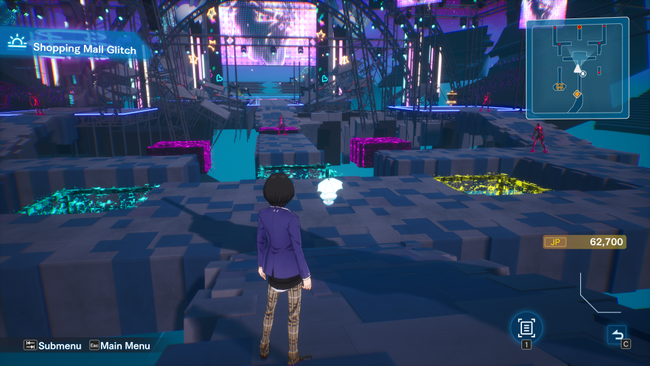
This isn't simply a 'this game is too easy' complaint. It's not a clever character build or a complex manipulation of mechanics. It's just How The Game Works, somewhat confusingly so. By the game's design, I cannot lose. Even if there were 1000x the enemy density, or if bosses had 1,000,000x the HP pool, I still cannot lose, because I can always heal. Unless I purposefully handicap myself, reaching the credits is a forgone conclusion and literally only a matter of time. You can change it to hard mode, but it won't change the outcome. It'll just take longer.
That's not even getting to my more typical RPG criticisms, such as how every dungeon area is practically the same, or how there are only about six different standard enemy types in total. Standard strategies of buffing, debuffing, and canceling attacks will carry you through what Varlet has to throw at you. Even if the way healing works is adjusted or nerfed in a future update to the game, Varlet would merely become an undemanding game instead, without significant reworking of multiple other systems. It's easy to accidentally overlevel, money is plentiful, and consumable items are abundant. In fact, consumable items are the only things you can actually spend money on, since there is no equipment system in Varlet.
And those six social stats? I almost forgot they were there as I played through Varlet. They do create some effects that improve your battle capability, but I find it hard to imagine that it's possible to lay out your stats in any way that would meaningfully help or hinder you. Just pick whatever choices you want in those Triad Judgements, and whatever result you get will be Good Enough.
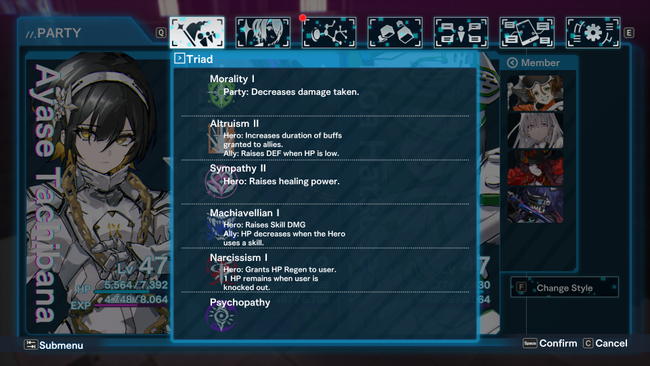
To me, the best RPGs are those where the various components of the game - narrative, combat, progression, exploration, etc - work in synergy with each other. I often approach games from the angle of an RPG gearhead, and I like to see how a game's mechanistic 'gears' interlock with each other to create a satisfying whole. Varlet's dissonant and half-hearted mechanisms instead feel disparate, as if they were conceived independently and weren't built to function together. With a superfluous SSS system that can be skipped entirely, and battles that can be effortlessly won by design, I find myself running out of things to latch onto here.
Playing Varlet — a game clearly inspired by Persona — brought to mind Kenichi Goto's lecture I attended at GDC earlier this year. As the lead battle planner for games like Persona 5 and Metaphor: Refantazio, one of the things Goto declared was that RPGs are, at their core, resource management games. "The main challenge in an RPG is: 'Can you reach your goal before you use all of your resources? ...You need to create situations where players are forced to decide *how* to use their resources."
I'll actually include a select quote from Goto's lecture here:
In Persona and Metaphor, the rewards you gain from your journey and daily activities are used to enhance you for battle. Therefore, we must make players think that they need these rewards to strengthen themselves as they proceed to take on stronger enemies later in the game. To put it differently, players need to find battles difficult enough so that they can't be cleared easily without these rewards. Otherwise, they'll end up skipping everything aside from the battles. That would essentially mean the death of the game entirely, when the players don't really have to think about what they're doing.
-Kenichi Goto, Lead Battle Planner at Atlus [GDC]
Other quotes from Goto also come to mind, such as "it's important to keep gamers thinking that they're on the edge of reaching game over to keep that sense of excitement and danger".
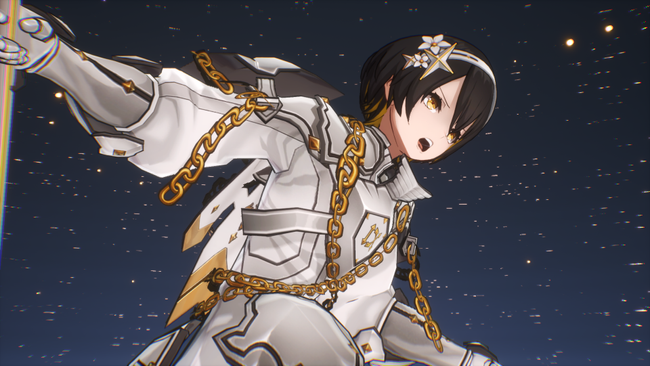
Goto's comment about "the death of the game entirely" is a phrase that came to mind as I trudged through the back half of Varlet. If the SSS social elements have no material effect on the rest of the game, and if it is a forgone conclusion that I will win every battle, and social stats can be safely ignored, then what am I even doing here? I feel like I'm being asked to throw darts a foot away from the dartboard. Where's the joy in that?
In examining Varlet's game design, I actually played through Varlet a second time, skipping all of the SSS-related social components like filling requests, finding items, reading notes, and placing ads. It makes no difference whatsoever to the game experience, besides missing out on a bit of NPC chatter. I gained no Likes, cleared no Glitches, and picked up zero items. And due to how the game mechanics work, you can take on any challenge — including the final boss on Hard Mode — by repeatedly pressing a single button on your controller. As long as Aruka is set to use her healing ability, you'll inevitably return to the victorious battle results screen. I know this, because I did this.
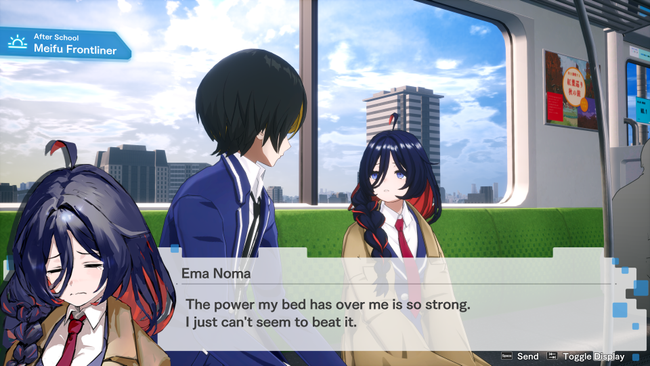
So if Varlet's social components tangibly lead to nothing, and if Varlet's combat components are what they are, then that leaves the narrative components and character writing to give the game any leg to stand on at all. I apologize that it took me this long to get here in this review, but here is where Varlet does have a modicum of intrigue.
In a world more and more dominated by social media, the internet, online presences, and relationships, Varlet seeks to examine how these topics intersect with the lives of high schoolers. In a setting literally dictated by Johari, the all-encompassing social network AI companion, the cast of Varlet each works through their own struggles, usually with a slant relating to being more visible than ever in a perpetually online world. Each chapter of the game centers around a different party member and highlights their personal conflicts. Sota, for example, desperately wants to grow in popularity as a streamer, but encounters numerous hurdles in deciding what that means to him, what he gets out of it, and what he truly wants to do. Noa is a member of the Security Bureau at Kousei, and she has to juggle questions about rule enforcement, surveillance, and privacy. Taiga, a student screenwriter, has to deal with how to properly balance praise and criticism in his movie-making endeavors.
Varlet's form of 'Social Links' come automatically during the main story, not during the SSS exploration sections. Called 'Character Episodes', you get to choose which of the six other party members you want to hang out with. By hanging out with a character, not only do you get to experience an event with them, but they will also gain Trust Points that can be used on that character's skill tree. So Sota's attack skills, Noa's defense abilities, and Aruka's healing? All of these can be unlocked or improved by hanging out with those characters, gaining Trust Points, and working through their skill trees. Or put more simply, the characters you hang out with will become the more powerful & useful characters in battle.
The number of Character Episodes you can see in a certain playthrough is limited, and the game will even warn you when you only have a few left before the ending. This does necessarily mean that you cannot max out all Character Episodes in a single playthrough. You can only reasonably get about half. For min-maxers out there, I suppose the means you could decide on three characters to hang out with and three to ignore completely, so you can get the most out of those skill trees. As I mentioned, Character Episodes are separate from the SSS 'Likes' system, and you cannot miss them. You will just have to choose which ones you want to see.
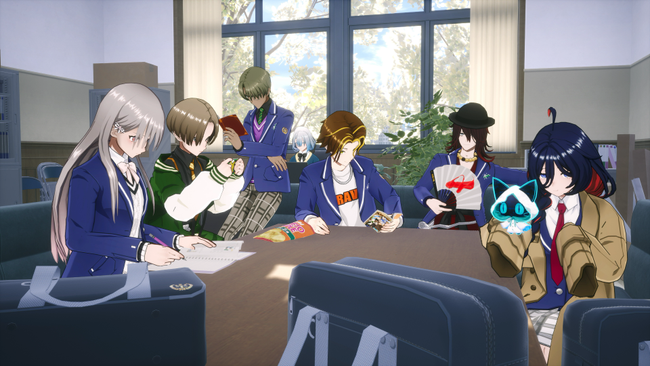
Varlet's has some pretty evident themes it tries to tackle, surrounding concepts like desire, ambition, jealousy, talent, recognition, bullying, etc. I get what it's going for, but it all felt a bit by-the-numbers to me. It's adequate but unremarkable. I also felt the broader narrative took one too many twists nearing the finale, which weakened my interest in it.
As for being the first simultaneous worldwide release of a FuRyu title, the English translation is a valiant effort, despite some typos. There are some decisions made that some players may have some strong opinions about, such as how characters refer to each other by first names only and no honorifics, despite there being only a Japanese voice track where names spoken don't always match the text box. Some informal slang can be found throughout — Sota throws an 'Iunno' at one point — but dialogue is largely believable, with each character having a certain 'voice' in the way they talk. My biggest criticism here is actually that some (not all) of the smartphone text conversations lean a little too heavily into l337speak type shorthand, which feels a little outdated to me. But I'm not a modern high-schooler in Japan, so I can't be an authority there.
For those picking up Varlet, my honest suggestion here is this. Check out the student conversations because you might find something mildly amusing, clear the Glitches if you want to, make the rare Triad Judgement choice, and don't bother with Likes. Enjoy the characters and story for what they are, and you might strongly attach to the style and themes on display. I only wish they had left more of an impact on me.
Varlet left me disappointed and bewildered. Despite some curious and evident narrative themes of adolescence in the social media age, Varlet's battle & social mechanics are stale at best and broken at worst. I went into Varlet with the best of intentions, but I came out weary and indifferent.